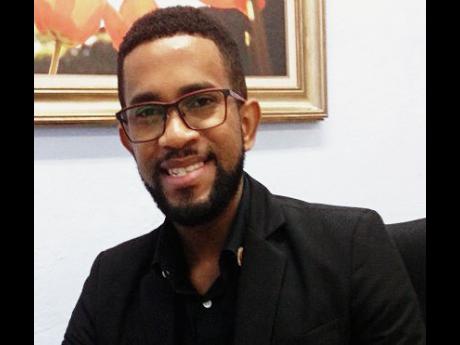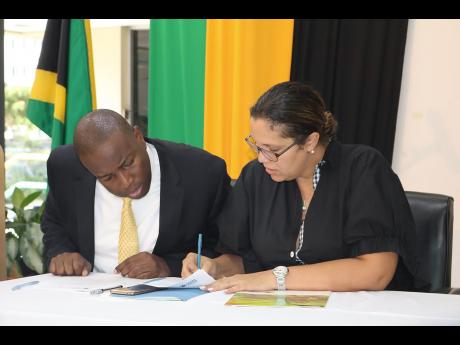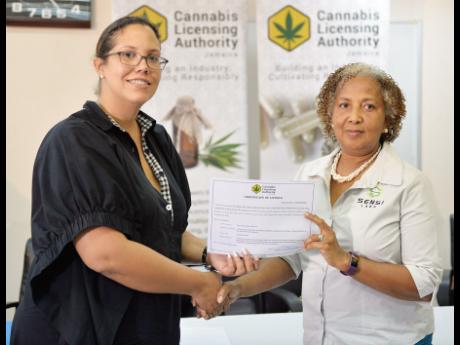'Regalise it'! - Urgent measures needed to ensure the proper regulation of the industry
Amid changing perspectives about the danger of marijuana, many states across the United States and around the world have relaxed, and, in some cases, effectively eliminated legal restrictions against marijuana use.
A range of factors is driving these changes.
These include the perception that the so-called 'war on drugs' has failed, the disproportionate impact of drug enforcement on low income and minority communities, and a broader criminal justice reform agenda.
The criminalisation of this plant has led to widespread stigmatisation of the industry that will take decades to correct. The shift of the Jamaican government to legalise and regularise an industry once stigmatised will need coherent and decisive leadership and a set of policies that will reap real benefits and allow Jamaica to generate billions from an industry once criminalised.
The establishment of the Cannabis Licensing Authority (CLA) to regulate the uses of marijuana in Jamaica is a significant step in the process to develop the industry. The Authority has responsibility for the issuing of licenses and permits as well as the monitoring of these licences and permits.
The legalisation of this plant has not, however, been met with concerns, chief among them is the production of this plant.
Most farmers will suspend producing other crops and place more emphasis on marijuana because it is easier to cultivate and matures faster for harvesting, and this may, therefore, present an excess on the market.
Jamaica's Chief Medical Officer Dr Winston De La Haye pointedly highlights that the improper use and consumption of marijuana has accounted for 47 per cent of those seeking treatment and rehabilitation for the period 2006 to 2011.
The statistics also indicate that over 95 per cent of adolescents referred from school and or though family networks for counselling were for problems associated with marijuana use.
The data further reveal that 70 per cent of the population has easy access to ganja, and children - some as young as 12 years old - have been trying the weed in its many different forms which includes sweets and cookies being sold at schools.
The Medical Association of Jamaica, in a release on the matter, has opined that further research is needed because the potential beneficial effects include reduction of pressure within the eyes caused by of glaucoma; appetite stimulation, especially for cancer patients with anorexia and AIDS patients; reduction in pain, muscle spasms and nausea.
While at the same time ganja has adverse effects such as changes in mood, impaired memory, addiction and breathing problems.
Context of the problem
Jamaica has for too long regretted its reputation as the land of dangerous drugs, more notably, ganja.
The cultivation of ganja has predominated the Jamaican space for decades. Whether used for religious, medicinal, or recreational purposes, the country did not make a significant thrust to develop the industry until recently when it was highlighted that a great opportunity existed in the industry.
In the United States, states such as Colorado and California have generated billions of dollars from marijuana. This rate of growth does not auger well for Jamaican citizens.
The country has developed several policies and programmes that have all been geared at driving growth. these include austere fiscal plans, the adoption of prudent macroeconomic policies, and creating a friendly climate for outside investors.
But a prudent and coherent policy to drive growth in the cannabis industry seems to be lacking.
The criminalisation of this plant has led to widespread stigmatisation of the industry that will take decades to correct. The shift of the government to legalise and regularise an industry once stigmatised will need coherent and decisive leadership and a set of policies that will reap real benefits and allow Jamaica to generate billions from an industry once criminalised.
The monetary exploits to be attained will be significantly beneficial to a developing country such as Jamaica.
This juxtaposition, however, of an equitable demand and supply stricture, mental health issues, under age usage, potential medicinal benefits, and economic exploits creates the imperfect dilemma that Jamaica currently faces.
Cannabis policy needed
A cannabis policy is urgently required for Jamaica. The goal of this policy should be to establish a framework for the regulation of recreational and medical marijuana in Jamaica.
The National Policy on Recreational and Medical Marijuana (NPRMM) 'Regalise It' would be a framework for action by the Government of Jamaica in the marijuana industry.
The policy should take into consideration Jamaica's position as the Mecca for 'high grade' weed and the juxtaposition of mental health issues and abuse of usage by adolescents and toddlers.
It is expected that this policy will:
- assist in the development of a rationalisation plan for cultivators of marijuana;
- aid in an equitable ratio in the demand and supply of cannabis;
- assist in minimising the number of adolescents and toddlers seeking treatment for mental health issues associated with exposure to marijuana;
- strengthen the legal framework for marijuana;
- aid in future decisions and policymaking initiatives on marijuana.
The NPRMM will also explicate on four alternative policy options that have been offered as potential solutions:
(1) The establishment of two zonal authorities to regulate the marijuana industry in addition to the CLA
(2) The implementation of tariffs and incentives
(3) Public awareness and engagement
(4) Maintaining the status quo and leaving the marijuana market unregulated
The establishment of two zonal regulatory authorities would make for a more fluid regulatory process to track marijuana use from seed to sale, while adequate research would alleviate the information asymmetry that exists currently, and a well-informed public awareness and education campaign would help to alleviate public health and safety concerns.
The CLA and the Western and Eastern Zonal Authorities would have responsibility for implementing the programmes and initiatives of the NPRMM 'Regalise It'.
A review of this policy should be done in year five of implementation to assess if the goals and objectives are being met and or are in need of revision or exclusion.
- This is a heavily edited presentation by Daniel Dixon, who is pursuing an MSc in International Public and Development Management in the Department of Government UWI-Mona. Email:danielraadixon@gmail.com or editorial@gleanerjm.com.



